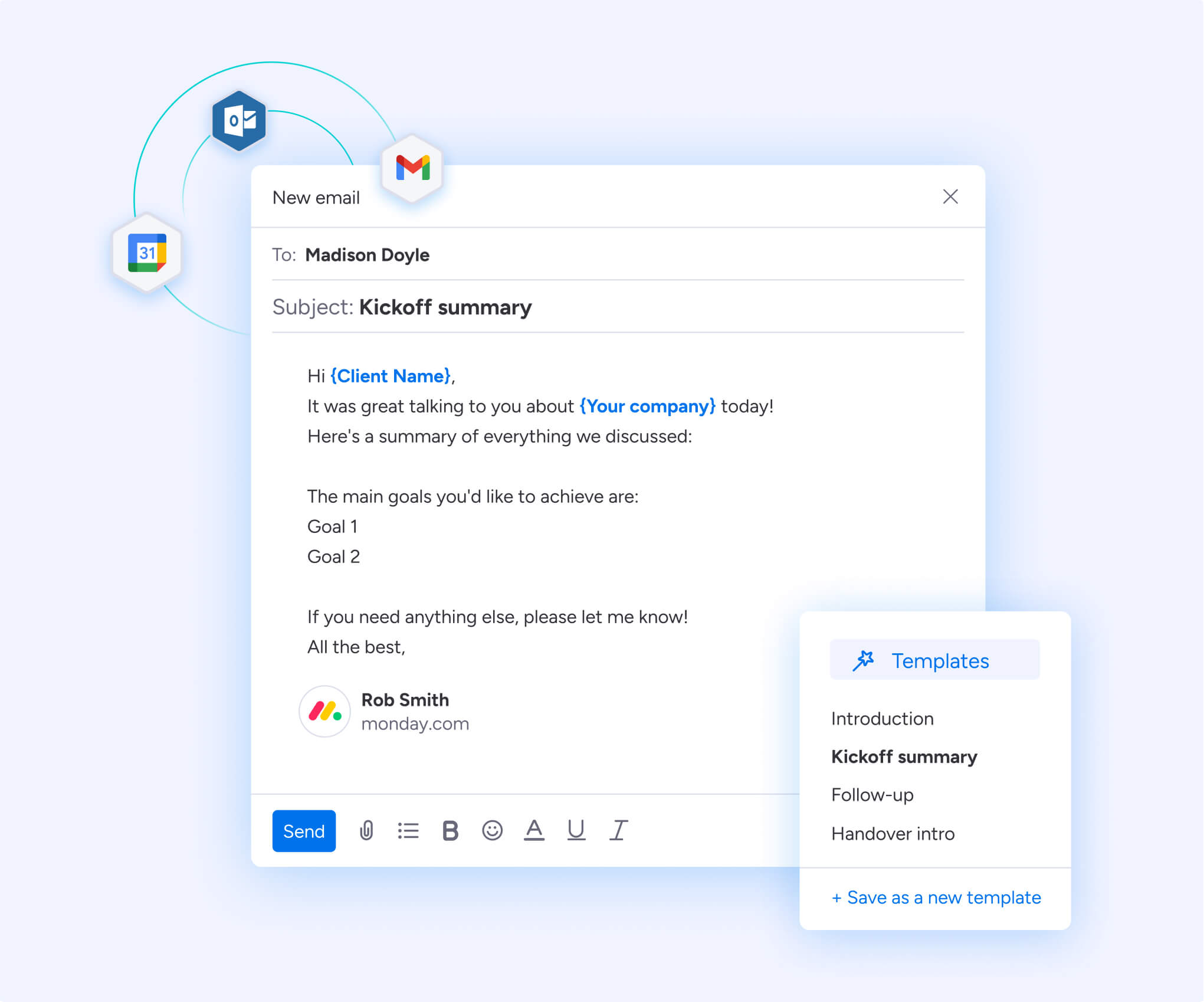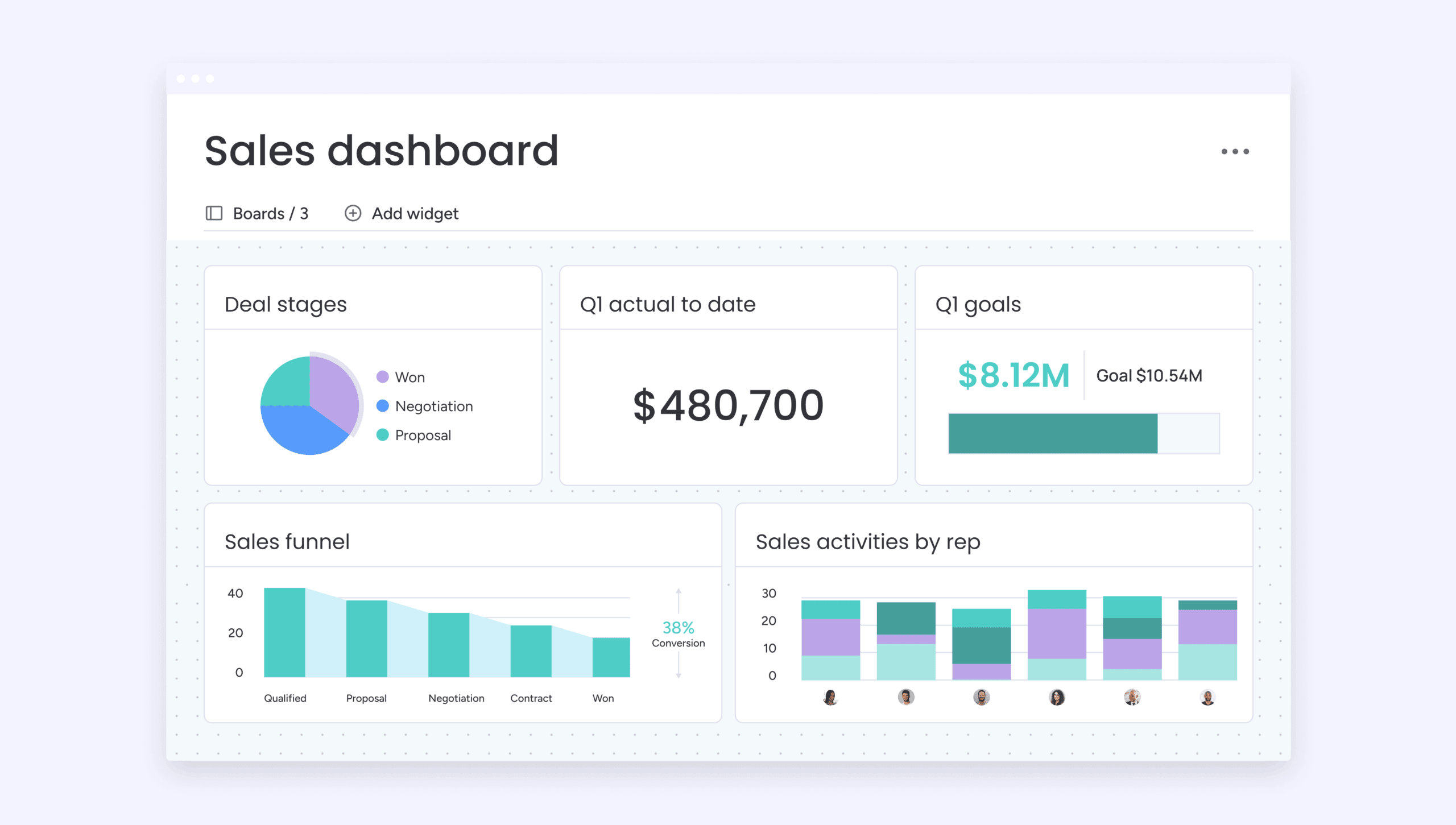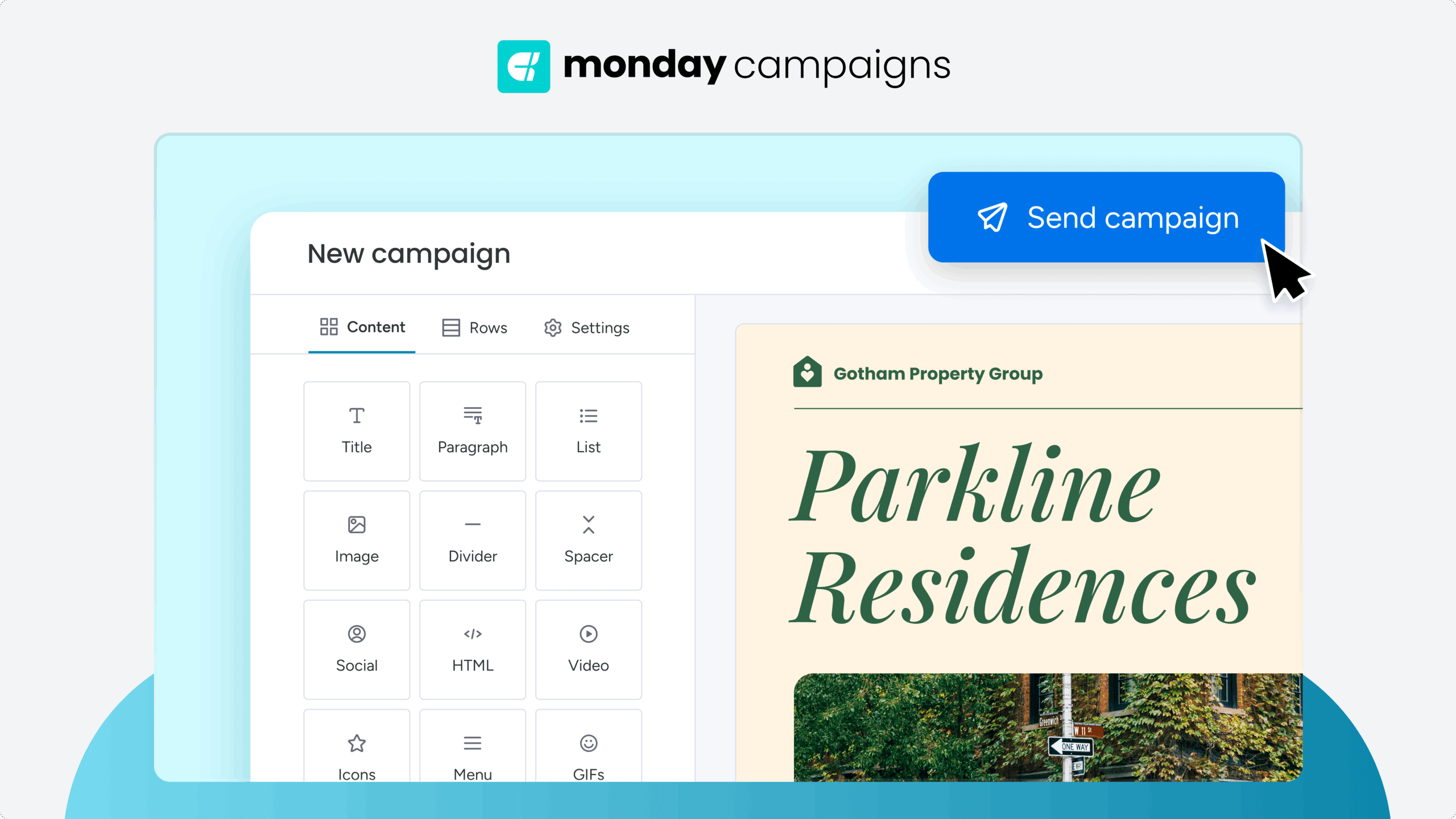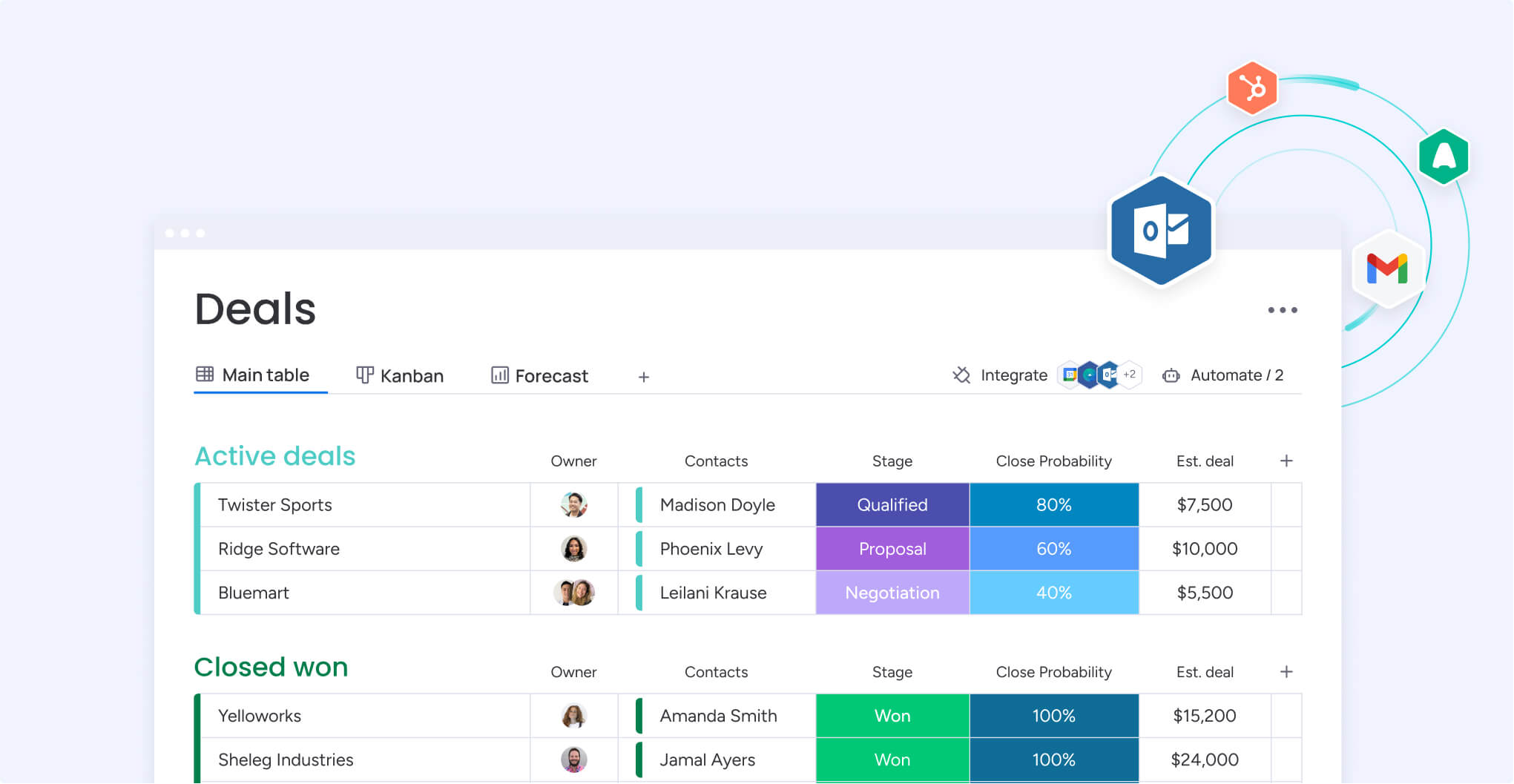Effective affiliate management is key to making your affiliate marketing program work. Many companies and advertisers use affiliate marketing to reach new audiences and capture leads, but without the right strategy and software to keep it all streamlined, your program may not work as efficiently as you’d like.
In this article, we’ll break down the fundamentals of building and refining an affiliate management strategy so that your business can reap the full benefits of your affiliate marketing program. We’ll also show you how a solution like monday CRM can automate the manual work involved in affiliate program management.
Try monday CRMWhat affiliate program management is and why it matters
Affiliate management is the oversight, coordination, and optimization of your business’s affiliate marketing program. In case you’re unfamiliar, affiliate marketing is a marketing strategy where you partner with affiliates, who then use their platform to market your business to their audience in exchange for a commission. For example, you might pay a commission every time you get a lead from an affiliate’s website or blog.
Affiliate program management involves maximizing opportunities with your affiliates, or partners, who may be industry influencers, content creators, coupon providers, comparison sites, or even individual fans of your business. It’s important to manage your affiliate programs because there are a lot of moving parts to track, including:
- Onboarding and recruiting new affiliates
- Building lasting affiliate relationships
- Tracking affiliate links and performance
- Establishing affiliate campaigns
- Monitoring affiliate compliance
This partnership-driven model is a great way for companies to expand brand awareness and drive traffic without upfront costs. However, to be successful with an affiliate marketing program, it needs to be closely managed to ensure everything is running as intended.
Why it matters: Affiliate program management directly impacts revenue, partner quality, and brand safety. When programs aren’t actively managed, brands risk inaccurate payouts, low-quality traffic, inconsistent messaging, and missed opportunities for growth. Strong oversight ensures your affiliates stay aligned with your goals, follow compliance rules, and consistently generate high-value conversions.
The core pillars of high-performing affiliate programs
There’s a lot that goes into managing an affiliate program. You need to be able to build out your creative assets and make sure they’ll resonate with an affiliate’s audience, protect your brand from third parties, and constantly optimize your program based on evolving data. To run an affiliate program successfully, there are a few core pillars to stay mindful of.
Strategic recruitment and onboarding
The foundation of your affiliate program comes down to the quality of your partners. High-quality affiliates are partners who align with your brand’s values, vision, and target customers. That’s why it’s important to not only look at metrics like social media likes or web traffic, but to focus on partners who can drive quality conversions because of their relationship with their audiences.
Once you’ve identified strong potential affiliates, onboarding determines how quickly they can begin promoting your brand. A structured onboarding flow should include brand guidelines, product information, creative assets, and clear commission rules. You can automate this with a solution like monday CRM to ensure every partner gets a consistent, efficient onboarding experience and becomes active sooner.
Compelling incentive structures
When you have a few solid affiliate partners who align with your brand, you want to make sure your program is designed to both retain and motivate them. Your program commission structure and incentives should include systems like tiered structures, performance-based bonuses, and compelling commission structures to encourage consistent growth.
Ongoing relationship management
Your affiliates are more than just business partners. In most cases, your affiliates started as your customers, and in order for them to transform their own audiences into your brand’s customers, you need to nurture your relationship so that it’s not only transactional. Always keep lines of communication open, and if possible, assign a dedicated affiliate manager who can understand individual needs and offer support when needed.
Reliable technology and tracking
Finally, a good affiliate program comes down to data. You need to have the technology setup to be able to reliably monitor partner performance. Affiliate marketing management software should help you attribute conversions, offer real-time reporting, and automate payouts so that your affiliates stay happy and your business can gauge which relationships are most profitable.
The 3 main types of affiliate
Affiliate marketing is often broken down into 3 types, with each one based on the relationship affiliates have with your product. Here’s a breakdown of the different types:
1. Unattached affiliate marketing
Unattached affiliates have no specific association with your products or services and simply recommend them to their audience in exchange for a commission. For example, an affiliate partner may promote products from a number of businesses through paid ads, earning a commission for each click or purchase. This type of affiliate marketing may be easier to manage since it’s more hands-off, but it often has lower conversion.
2. Related affiliate marketing
Related affiliates are aligned with your business’s niche, but aren’t necessarily promoting your products from personal experience. For example, a blogger or podcaster in the health and wellness space may be an affiliate for a fitness equipment company despite having never used their products. This kind of affiliate marketing is likely to generate a good amount of engagement and traffic since the audience is already interested in what affiliates are promoting.
3. Involved affiliate marketing
Involved affiliates are the crème de la crème of the affiliate world. These partners are typically more involved with your brand and have maybe started out as just a customer. They have experience using your product or service, believe in it, and their recommendations are tailored and personal. For example, the same wellness blogger might have experienced a lot of benefits using a brand’s fitness-tracking app and promotes it to their audience using real examples of how it helped them.
When developing your approach to affiliate program management, it’s worth noting down the quality of the relationship you have with each affiliate. Your expectations and investment in unattached affiliates will be very different from those you should have with your involved affiliates.
Measuring success: Essential affiliate performance metrics
Attribution accuracy is the backbone of affiliate program management. Effective tracking includes monitoring click-to-conversion paths, ensuring commission rules trigger correctly, and validating that partner payouts reflect real performance. Use dashboards to view ROI at-a-glance, compare affiliate tiers, and spot anomalies early. AI-powered analytics can also help forecast future revenue, surface underperforming partners, and automatically flag suspicious activity that may require compliance review.
Here are some key metrics to track:
- Total affiliate revenue: How much revenue all your affiliates are bringing in will help you determine the overall success of your program.
- Conversion rate: The percentage of affiliate clicks or leads that result in a sale, showing you the quality of traffic from different partners.
- Average order value (AOV): The quality of sales generated from affiliates helps you identify which partners drive high-value customers.
- Return on ad spend (ROAS): Determine the profitability of your program by comparing how much revenue you’re generating compared to commissions paid.
- Click-through rate (CTR): A CTR helps you see how well an ad, link, or campaign is performing so that you can guide an affiliate to reassess messaging if there’s a low rate.
- Revenue per click (RPC): Understand how much revenue each click from an affiliate partner is really generating to uncover your high performers.
- New leads and lead source: Always track new incoming leads and where they’re coming from to see if there’s a type of content or ad that audiences resonate with.
- Affiliate retention rate: Measure the success of your program and the value it provides by tracking how many of your affiliates are staying quarter after quarter, year after year.
6 top affiliate program management software options
With so many metrics to track and partner relationships to manage, relying on manual processes or scattered tools increases the risk of errors. The last thing you want is to pay out incorrect commissions and damage relationships with high-quality affiliates. The easiest way to keep everything organized is with affiliate program management software.
Here are some of the top tools available:
| Use case | Starting price | Free trial | User rating | |
|---|---|---|---|---|
| monday CRM | All-in-one AI CRM for managing affiliate and partner relationships | $12/seat/month | 14 days | 4.6/5 (G2) |
| impact.com | Affiliate and influencer ROI platform to track partnership revenue | $30/month | Free demo | 4.5/5 (G2) |
| Tracknow | Affiliate management for ecommerce, iGaming, and prop trading businesses | $116/month | 14 days | 4.9/5 (G2) |
| Affiliatly | Budget-friendly affiliate management for ecommerce stores | $16/month | 90 days | 4.4/5 (G2) |
| Everflow | Partner marketing for agencies and D2C brands tracking affiliates and media buying | Contact sales | Free demo | 4.7/5 (G2) |
| LeadDyno | Simple affiliate marketing for ecommerce brands and startups | $49/month | 30 days | 4/5 (G2) |
Not every business needs a standalone tool that only specializes in affiliate tracking. Depending on your workflow, an all-in-one platform like monday CRM can be a smarter choice. It lets teams track essential metrics while also automating partner nurturing, communications, and follow-ups with AI — all within a single unified workspace. This prevents data silos and gives your sales and marketing teams shared visibility into affiliate-driven revenue.
Should you outsource your affiliate program? When to hire an OPM company
Whether you should seek out an outsourced program management (OPM) company depends entirely on the size of your program and how much capacity your team has to properly manage it. OPM agencies can make it a lot easier to build an affiliate program by doing a lot of the legwork for you, such as seeking out high-quality partners, negotiating terms, and handling payments.
On the flip side, these agencies can significantly eat into your affiliate program budget. Instead, consider investing in the right software to automate a lot of the manual work so you can focus on recruiting and building relationships. A platform like monday CRM can take a lot of the repetitive work, like follow-ups, communication, contracts, and reporting, out of the equation.
Try monday CRM5 best practices for managing and scaling affiliate program management

If you want to get the most out of your affiliate marketing program, you need to manage your affiliates effectively. If you’re just starting with affiliate management, or you already have an affiliate program in place but you aren’t seeing convincing results, these best practices should help you boost your results.
1. Choose the right partners
Finding the right partners is key to achieving significant results from your affiliate program. Here’s a short list of qualities to look for in an affiliate partner:
- Influential: Your ideal affiliates have an engaged audience who trusts them and is ready to take their advice. Don’t mistake partners with large audiences as automatically having more influence than smaller ones; reports show that micro-influencers (10K-50K followers) outperform mid-tier influencers (50K-100K followers) by 46%.
- Proactive: Find affiliates who will actively promote your products and services without needing too much direction or prompting will be more effective than those you constantly need to push.
- Motivated: Even if someone is influential, they may not be very interested in marketing your products or services unless they are likely to see significant commissions in return for their efforts.
- Connected: Look for affiliates who have a relationship with your target market. Otherwise, even if they drive you multiple leads, those leads won’t be likely to purchase.
- Aligned: The wrong affiliates could put off your target market instead of attracting them. Look for affiliates who are ethical, likely to follow your brand guidelines, and whose business values align with yours.
2. Create a strategy to connect with your ideal affiliates
When building your strategy, you want to focus on 3 key areas: differentiation, proactive outreach, and setting clear expectations.
- Articulate your value proposition: Beyond commission rates, highlight what makes your program attractive, whether it’s dedicated support, exclusive discounts for their audience, early product access, or performance bonuses.
- Don’t wait for affiliates to find you: Build targeted lists of potential partners and craft personalized outreach messages that reference their specific content or audience. Use monday CRM to track outreach status, schedule follow-ups, and manage your recruitment pipeline systematically.
- Establish program requirements: Clearly define your application criteria, approval timeline, commission structure, payment terms, and prohibited promotional methods. This transparency attracts serious partners and filters out those who aren’t a good fit.
3. Nurture partner relationships and maintain compliance
If you want your affiliates to perform, you need to make sure that you are in regular contact with them. That way, they are up to date with your products, services, messaging, and the latest news from your company. It’s also a good way to keep your brand front of mind when they’re planning their new content. To improve your relationships with your affiliates, consider:
- Offering regular check-ins to keep in touch with your affiliates, answer questions, and make suggestions for how they could improve their commissions
- Setting up automated emails every time they get a new commission, so they remember the benefits of working with you
- Creating a weekly or monthly newsletter with product updates and messaging tips
- Offering additional rewards and incentives to top performers, to encourage your affiliates to increase their promotional efforts
- Creating time-sensitive campaigns where your affiliate incentives will increase for a short period only, to build a sense of urgency
Maintain compliance by routinely reviewing affiliate content, monitoring trademark usage, and using software tools that automatically flag suspicious traffic or policy violations.
4. Use affiliate management software
Effective affiliate management will require a way to store and organize information about your affiliate partners, and also a way to manage your communications with your affiliate network. Using affiliate management software will help you keep track of how your affiliates are doing and make sure you hit your affiliate marketing targets.
We’d recommend that you look for a solution that is:
- Customizable: Easily set up your affiliate program, use labels to indicate different tiers for each type of affiliate, and track multiple commission structures
- Centralized: Keep all the information involved in your affiliate program, such as contact information, commission structures, campaigns, marketing materials, reports, and communications in a single shared source of truth
- Integrated: Seamlessly connect your affiliate program management data to your CRM, payments system, marketing communications tools, reporting system, or any other technology you’re currently using
With a platform like monday CRM, you can strengthen your relationship with your affiliates with automated email sequences and centralized communication tools that help you send regular emails and newsletters to keep your affiliates engaged.
5. Provide ongoing education and enablement
Successful affiliates aren’t just given links; they’re equipped with knowledge and resources to succeed. Aside from creative or marketing assets, you want to set your partners up for success by giving them all the tools they need. Here are some ideas of what to offer:
- Host regular webinars or training sessions covering your product benefits, target customer pain points, and conversion best practices
- Create a resource hub with comparison guides, objection handlers, customer testimonials, and case studies that affiliates can reference
- Share what’s working for top performers through monthly “affiliate spotlight” features.
The more educated your affiliates are about your offering and ideal customer, the more effectively they’ll promote and the higher quality traffic they’ll drive. To make it easier to offer ongoing education and self-help resources, consider a multi-product software solution. For example, by integrating monday CRM with monday service, you can create self-help portals that include learning materials, knowledge hubs, and AI service agents.
How monday CRM can supercharge affiliate program management
Affiliate program management requires a centralized system for tracking partners, automating communication, and understanding performance across channels. With monday CRM, you can bring these workflows into one place so teams can manage recruitment, onboarding, commissions, campaigns, and reporting without juggling multiple tools.
Thanks to monday CRM’s powerful AI features, affiliate managers can use the platform to automate a lot of the repetitive work, leaving more time for the work that matters most: finding the right partners and building relationships with them. Not only that, but the benefit of a full CRM means you can use the platform for more than just affiliate management, but also see how affiliate sales are affecting your revenue and lead acquisition.
Here’s a closer look at how monday CRM’s features can help your team with affiliate management.
Centralize and automate affiliate communications

If you’re managing a lot of different partners, staying in contact with them can be time-consuming. With monday CRM, you can automate communications like follow-ups and sending assets or reminders. The AI email writer makes it easy to generate personalized communications, so that you can reach all your affiliates in just a few minutes.
Get high-level insights into performance

The platform is packed with data analytics tools, including AI-powered dashboards and reports that give you a visual snapshot of affiliate progress and performance. It’s also easier to make data-driven decisions thanks to monday CRM’s powerful predictive analytics and forecasting tools, which can help you see future sales based on historical data, like affiliate sales and trends from previous months or quarters.
Craft marketing assets and campaigns with AI

Build marketing campaigns from start to finish with monday campaigns, which integrates seamlessly with monday CRM. Then, share your campaigns with your affiliates so they have ready-made assets to use for their audiences. You can also use monday campaigns to create regular newsletters for your partners so that they’re always up to date on brand news, product launches, and affiliate success stories.
Connect with the platforms you need to sync data

There are over 200 third-party app integrations with monday CRM, making it simple to connect your work tools and sync your data and workflows. This way, you can connect your payment processors to your CRM to make it easy to automate payouts. Additionally, you can connect social media channels like Facebook and Instagram to stay on top of your affiliates’ posts and collect data.
Looking ahead: Trends in affiliate management for 2026
Affiliate management is evolving quickly as AI and privacy regulations reshape how programs operate. Expect more influencer–affiliate hybrid partnerships, dynamic commission structures based on predicted conversion likelihood, and deeper integrations between affiliate tools and CRM platforms.
With third-party cookies disappearing, AI-driven attribution models will become essential for understanding multi-touch journeys. Programs that adopt these trends early will scale faster, reduce overhead, and deliver more consistent results.
A successful affiliate program management strategy starts with the right software
A well-managed affiliate marketing program can lead to increased revenue, stronger brand awareness, and even improved brand reputation. However, if your program is mismanaged because of siloed workflows that lead to a breakdown in communications, you’re missing out on potential revenue and business growth.
With monday CRM, you can manage your affiliate program top to bottom while integrating additional sales and marketing workflows for a holistic view of your partner relationships and business performance.
Try monday CRMFAQs
What is a reasonable commission rate structure for a new affiliate program?
The commission rate you should use will differ depending on a few factors, such as the product you’re selling and the partner you’re working with. For example, digital products will have a higher commission (10-20% or higher) than physical products (5-10%) with lower margins. Research competitor rates in your niche and consider tiered structures that reward top performers with favored rates for higher volume thresholds.
How can I effectively manage fraud and ensure compliance in my affiliate program?
To manage fraud and stay compliant, implement cookie stuffing detection, monitor for trademark bidding violations, and review suspicious conversion patterns regularly. Set clear program terms prohibiting incentivized traffic and coupon abuse, and use tracking platforms with built-in fraud detection. You should also conduct periodic affiliate audits, spot-check landing pages, and maintain a violation policy with warnings before termination.
What are the best practices for providing creative assets and tools to affiliates?
You’re going to want to centralize all your promotional assets in an accessible affiliate portal or shared workspace. Use a solution like monday CRM to organize asset libraries by campaign, track which affiliates downloaded which materials, and automate notifications when new banners or product information becomes available. Provide multiple banner sizes, email templates, product images, and pre-written copy that affiliates can customize.
What key data points should be included in an affiliate performance report?
Key data points to include in an affiliate performance report include clicks, conversions, conversion rate, revenue generated, commission earned, average order value, and period-over-period growth. Add top-performing products or services, traffic sources, and a new versus returning customer breakdown. Compare individual performance against program averages to help affiliates understand their standing and identify improvement opportunities.
What is the role of a dedicated affiliate program manager?
A dedicated affiliate manager recruits quality partners, onboards new affiliates, maintains ongoing relationships, and resolves issues promptly. They analyze performance data to optimize commission structures and promotional strategies, create newsletters with program updates, identify top performers for special opportunities, ensure compliance monitoring, and serve as the primary contact fostering community among affiliates.

